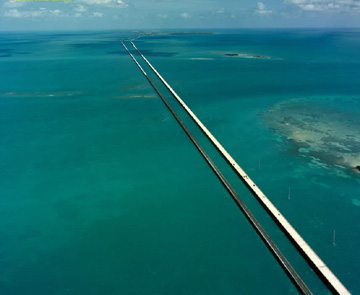|
Home
|
Wet Foot - Dry Foot, Martinez And Nelson Florida's senators differ on the policy Florida's two senators differ on what should be done about the wet foot/dry foot policy begun by the Clinton Administration and continued by the Bush Administration. The policy says that if a Cuban refugee reaches dry land in the US, the US will follow the law and allow the Cuban to stay in the country. If the Cuban is still on the water in any manner, the US refuses to follow the law and sends the poor wretch back into the jaws of fidel's gulag. It's much as though if an East Berliner made it over the wall, but got his pants leg hung on the barbed wire. I don't recall us throwing anyone back over. Now Senator Mel Martinez, a Republican, tells the Miami Herald he thinks the policy should end. Senator Bill Nelson, a Democrat, says he thinks the policy is poorly implemented but should remain in place. Martinez says he favors going back to policy from more than a decade ago, when virtually all Cuban migrants were rescued by the Coast Guard and brought ashore. Nelson supports keeping the 1994 policy that usually returns Cubans caught at sea but wants it more ''fairly'' enforced so Cubans who reach any portion of the United States, even an unconnected bridge, are allowed to stay. Martinez is a member of the Senate Foreign Relations Committee and hopes to hold hearings on the policy soon. He says the migration accords reached between the US and Cuba following 1994's explosion of rafters was bad for the Cuban people and bad for the US. He points out that conditions have worsened on the island since. Nelson blames the Bush Administration for having a "heart-of-stone" in its administration of the policy., He does not say how the Bush Administration differs in administration from the Clinton Administration, which, he admits, began the policy. In a separate article, the Herald takes a look at the origins of the policy. It points out what a lot of people forget - it was Florida Governor Lawton Chiles, a Democrat, and Jorge Mas Canosa, a Republican, who howled loudest in 1994 and who forced the Clinton Administration to act. While many of the current protesters blame the Clinton administration for the reviled policy, few talk about its history. Many in South Florida forget how the 1994 balsero crisis, which ultimately led to the wet-foot, dry-foot policy, divided the local Cuban community. As the number of Cuban boat arrivals mounted that summer, President Clinton responded to then-Gov. Lawton Chiles' request and ordered the Cubans interdicted and taken to Guantánamo Naval Base. When Cuban exiles protested that this punished Cuban refugees and not Castro, Mr. Clinton took the advice of Jorge Mas Canosa, the influential Republican chairman of the Cuban American National Foundation: Remittances and family visits to Cuba were halted altogether. But interdictions continued. It's time to end this absurd policy. If someone escapes from communism, the US should welcome that person, just as it did the Germans, Poles, Hungarians and Yugoslavs during the Cold War. | Technorati Tag: Cuba |
 Just last month,
Just last month,